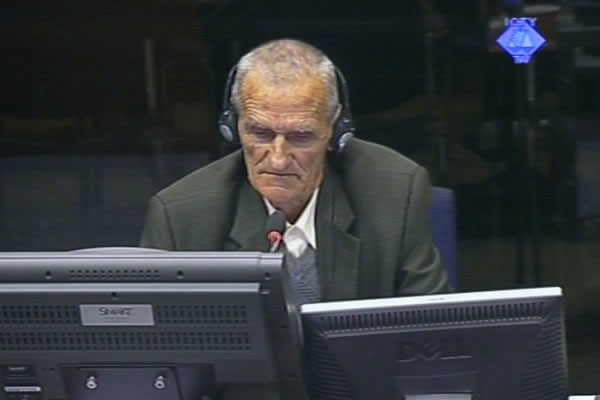Home
WHEN SHELLS SPEAK
One of the few survivors of the Srebrenica execution sites testified at Ratko Mladic’s trial today. This is the sixth time he has given evidence before the Tribunal. The witness described why he decided to leave his house in Srebrenica together with his family on 11 July 1995
 RM255, witness at the Ratko Mladic trial
RM255, witness at the Ratko Mladic trial A Bosniak from Srebrenica, survivor of the execution of prisoners at the Branjevo farm near Pilica in July 1995, has already testified five times before the Tribunal. At the trial of Ratko Mladic, the witness testified under the pseudonym RM 225 but without image protection. The prosecutor read out the summary of his statement. On 11 July 1995, the witness and his family left Srebrenica and headed to Potocari and the UN Dutch Battalion base. The witness’s sons joined the column of civilians and soldiers trying to reach Tuzla through the woods.
In Potocari the witness was separated from his wife, daughter-in-law and grandchildren and was detained briefly in ‘a house’, as he described it. The next morning, the witness was transferred to Bratunac together with the rest of prisoners. There, he was detained in the Vuk Karadzic school. Some prisoners were taken out, beaten up and killed. Two days later, on 15 July 1995, they were told they would be taken to Tuzla. However, the buses they were on headed towards Zvornik. Prisoners were detained again in a school, this time in Pilica. On 16 July 1995, they were taken from the school, brought to ‘a field about 2.5 km away’ and executed. The witness was miraculously left unharmed and managed to flee the execution site that same night. After about 10 days of wandering through the woods, the witness surrendered to the Bosnian Serb forces. He was transferred to a prison camp in Batkovic and remained there until 23 December 1995 when he was exchanged. The witness’s sons didn’t survive.
The witness first answered some additional questions by the prosecutor, recounting how nobody questioned the men detained in the house in Potocari or even wrote down their names. ‘The only thing they wanted to know was if anyone had any money’, the witness said. The prosecutor tried to show that the VRS soldiers didn’t separate the men from the rest of the population in a bid to determine if there were any men suspected of crimes against the Serbs among them. This is what the defense argued at all the trials for the crimes in Srebrenica so far. The real reason the men were separated was because they were to be killed, the prosecution argues.
In the cross-examination, Mladic’s defense counsel revisited the topic. When the defense counsel asked the witness if he had heard about the lists of Bosniak suspected of war crimes against Serbs, the witness replied that he did, but there had been no questioning at all. ‘I heard about that but no one was questioned and sent to the camp, instead of killing all of them just because they were Muslims’.
In a bid to prove that the BH military and political leadership ordered the Srebrenica population to leave the enclave, the defense lawyer asked the witness who told him on 11 July 1995 that he should go to Potocari. ‘The shells told me’, the witness replied, describing how the shells came in from everywhere, hitting the town. The only choice was to flee Srebrenica, he recounted.
Judge Orie thanked the witness on behalf of the Trial Chamber for coming once again to The Hague to testify. ‘I want to thank you for calling me to give evidence and tell the truth and seek justice, and there is no justice without life imprisonment’, the witness replied.
Linked Reports
- Case : Mladic
- 2012-07-18 KINGORI: IN SREBRENICA MLADIC DIDN’T MEAN WHAT HE SAID
- 2012-07-17 DEPORTATION IS ‘FORCIBLE EVACUATION’
- 2012-07-16 MLADIC SHOWS HE IS IN GOOD SHAPE
- 2012-07-20 MLADIC MAKES OFFENSIVE REMARKS ABOUT SREBRENICA VICTIMS
- 2012-08-21 ‘SCOURGE OF SARAJEVO’ CONTROLLED PRESSURE IN CITY
- 2012-08-22 MLADIC CAUTIONED FOR INSULTING WITNESS AND MAKING LOUD COMMENTS IN COURT
